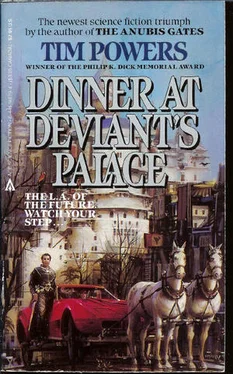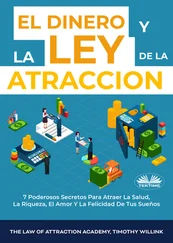Rivas looked at his own right hand. The fingers were swollen and black, and at least two of them seemed not to be attached to the hand very securely. Poor old hand, he thought sadly.
He looked around, ignoring the mildly interested stares of a couple of children who'd been digging in the trash. He was in a wide court with high foliage-topped brick walls, and an arch to his left showed a segment of old alley that someone had tried to brighten by painting a lot of vividly blue birds across the surface of it. Certainly seems to be Venice, he thought.
He got up and limped over to where the boy lay. The boy's eyes were open, staring straight up into the noon sun, and Rivas crouched to close them.
» New girls!» the boy exclaimed suddenly. « All right, gonna give 'em a treat, let 'em receive the sacrament from the Messiah himself, yes sir. . . .»
«Good afternoon, Sevatividam,» said Rivas wearily.
» And won't I touch them! Oh my, yes . . .» the boy said, and the contrast between the fatuous insinuation of the voice and the bony, wasted face it issued from was appalling.
«I've come to take one of them away from you.»
» Some pretties and some piggies,» the boy said judiciously.
«You know,» said Rivas hoarsely, leaning forward and bracing himself against the wall with his good hand, «I don't think I can kill people anymore. Animals, even.»
» The piggies I'lltouch with my finger.»
«But I believe I could kill you. I believe I'll try very hard to do that.»
As the boy's voice diminished into muttering about how tasty it would be, Rivas tried, one-handed, to pick him up. A week ago he might have been able to do it. After five minutes he gave up and stood up straight.
The two children had resumed digging around in the trash—their ancient shopping cart was half full of junk– and Rivas said, «Hey. Kids.»
They looked up warily, their eyes in the wide, unspecific focus of animals ready to bolt in any direction.
«Could you . . . keep an eye on my friend here for a few minutes?» He knew he might as well be making the request to a couple of the monkeys swinging around and screeching in the wall-top greenery, but he needed to make the gesture, needed to let the universe know that he wasn't ditching the boy.
The children stared at him, and one of them might have nodded before resuming the excavations.
«Thanks.» Rivas trudged to the arch and through it to the narrow alley outside. Tall houses, liberally scaffolded with wooden and iron balconies, leaned against each other in the sun, and to his right the alley was shaded by the rooftop connection of two old buildings, one on either side of the alley, that had bowed forward until their tops touched, like a couple of ragged old women exchanging gossip.
He knew where he was; a block or two north would be the Imperial Canal—no, it was Imperial Highway this far inland—and three or four blocks north of that would be the restaurant where he'd first got a job washing dishes. And where had that doctor lived? In a basement only a few buildings away from the restaurant, he recalled. The standards of cleanliness in the restaurant's kitchen had provided the man with plenty of patients. And Rivas had gone back to him a few times during the ensuing years—once for a clap cure and a couple of times to have dueling wounds sewed up.
Rivas set off in that direction, noticing apartments where friends had lived whose names he now couldn't remember, terrace bars where he'd taken young ladies for drinks on
long ago late nights, canals he'd fallen into . . . . Much had
changed—there were lots full of charred rubble where he remembered houses, new bars that had been Junk & Relic stores in his day, a new wide hole in the street where some cluster of antique sewer tunnels must have collapsed, over which a gaily beribboned but unsteady bridge had been built—but so much had not changed that he thought the ghost of young Gregorio Rivas must still haunt these streets and alleys and rooftop bridges; a self-consciously cynical ghost, inordinately proud of its skill with both sword and pelican, its capacity for liquor, and all the dues it imagined it had paid. The place was still Venice, where he'd spent his youth, still crowded with old buildings rotting under bright new paint, curbside hot food vendors, shouting parrots and street lunatics, still redolent with the smells of ordure and spicy cooking.
Though the restaurant had mercifully burned down, the doctor's building was still there, but as he scuffed down the steps to the man's door he wondered whether he would still be there. It had been—what—six years? He knocked at the door.
After a few seconds it swung open and he felt weak with relief to see that the man peering out of the doorway was the doctor. «Doctor Dendro!» Rivas said. «I'm glad you still live here. Do you still have that thing you used to call a stretcher barrow? There's a—»
The gray-haired man was frowning. «Who are you?» he interrupted.
«Don't you recognize me? I'm Greg Rivas. I came to you several times for—»
«Rivas.» The doctor stared at the ceiling. «You had the clap.»
«Well,» said Rivas, nettled in spite of everything, «yes. Once. But right now I'd appreciate it if you'd—»
Abruptly the doctor saw Rivas's hand. «My God, man, what have you done to your hand? Come in here and—»
«Doctor,» said Rivas loudly, «I'd be grateful if you'd look at my hand.» More quietly, he went on, «But first I wish you'd get your stretcher barrow and come look at a friend of mine.»
«He worse off than you?»
«Yes.»
«All right.» The doctor waved him inside, and when Rivas had reeled in and blinked around enough to be able to see in the dimness, he smiled, for the place hadn't noticeably changed since his last visit. Here was still the old wood stove autoclave, here were the window-blocking stacks of terrarium mold gardens, the astrological charts and the live, caged, two-headed snakes which may patients insisted be consulted before they'd accept any medication, the cupboards full of ancient and almost certainly useless bottled pills.
Doctor Dendro had put on his antique white coat with Doctor, Doctor, Gimme The News stitched on it, and from a closet rolled out the extended, padded wheelbarrow Rivas remembered. «Your man in much pain?» he asked Rivas.
«Unconscious.»
«Won't risk bringing a hypodermic needle, then. Broke one since you were in last. Down to seven now.»
He wheeled the device out the door and Rivas followed.
«I can't pay you today,» Rivas said, «but as soon as I get back to—»
«I'll take an I.O.U.» As they went up the steps the doctor sniffed. «Or will I? Blood's bad stuff, Rivas. You used to have a little more sense.»
«It was an accidental dose. I gave some to this friend of mine as a, a sedative, and we both wound up doused in it.»
«It's only a sedative to people who want that kind of sedative.»
When they got up to street level Rivas swayed dizzily in the sudden blast of sunlight.
«Sure you don't want a ride in this yourself?» Dendro asked dubiously.
«No—thank you—I'd fall asleep, and when I next sleep it's going to be for about twelve hours.»
He led the doctor back to the alley, and down it to the arch in the wall, and when he stumbled into the enclosed court the two children were gone but of course the far-gone still lay where he'd been, at the foot of the garbage pile. Rivas pointed, then leaned back against the wall and slid down it until he was sitting.
The doctor trundled his wheelbarrow over to the boy and crouched to look at him. He picked up one of the skeletal wrists, then dropped it and pushed back an eyelid. He looked over at Rivas and then stood up. «Sorry,» he said. «Boy's dead.»
Читать дальше












